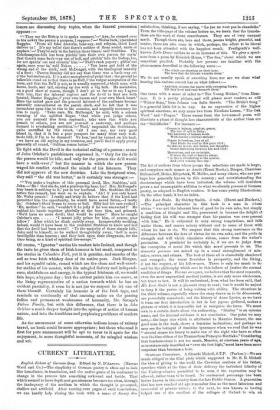Ills Last Stake. By Shirley Smith. 3 vols. (Hurst and
Blackett.) —The principal character in this book is a man in whom virtue "was not the inherent love of good for its own sake, but simply
a condition of thought and life, persevered in because the delight of feeling that his will was stronger than his passion .vas ever present
with him." Ho is subjected to very strong temptations. and falls under them, and causes misery without end to some of those with whom ho has to do. We suspect that this strong insistence on the difference between the love of virtue for its own sake, and the pride in strength and will which simulates virtue, comes from the writer's pessimism. A pessimist he certainly is, if we are to judge from the conception of social life which this novel presents to us. The dramatis personce are mixed up in a cruel entanglement of mis- takes, errors, and crimes. The best of them all is shamefully slandered and wronged ; the worst flourishes in prosperity, and the liking, if not the respect, of his fellow-men. There is only too much to be said for the philosophy which sees in this failure of justice the normal condition of things. For our own part, we believe that the most romantic, even the most unpractical poetical justice, is not only more wholesome, but truer to fact. It will be understood, from what has been said, that His Last Stake is not a pleasant story to read ; but it would be unjust to deny it the praise of being written with ability. The situations in the third volume, especially where the story draws on to its denouement, are powerfully conceived ; and the history of Anne Lyster, as we have it from our first introduction to her in her joyous girlhood, makes a picture of which it is impossible not to recognise the force. We must own to a certain doubt about the authorship. " Shirley " is an epicene name, and the internal evidence is not conclusive. One point we may note,—the huge size which is attributed to Maurice Donner, The one good man in the book, shows a feminine inclination ; and perhaps we may see the betrayal of feminine ignorance when we read that he was "several stones too heavy to make one of the eight who have so often won the bl ne ribbon of the Thames from Putney to Mortlake." Considering that fourteen-stone is not too much, Maurice, at nineteen years of age, as to stature only described as "over six feet high,"mtut have been more corpulent than becomes a hero.






























 Previous page
Previous page